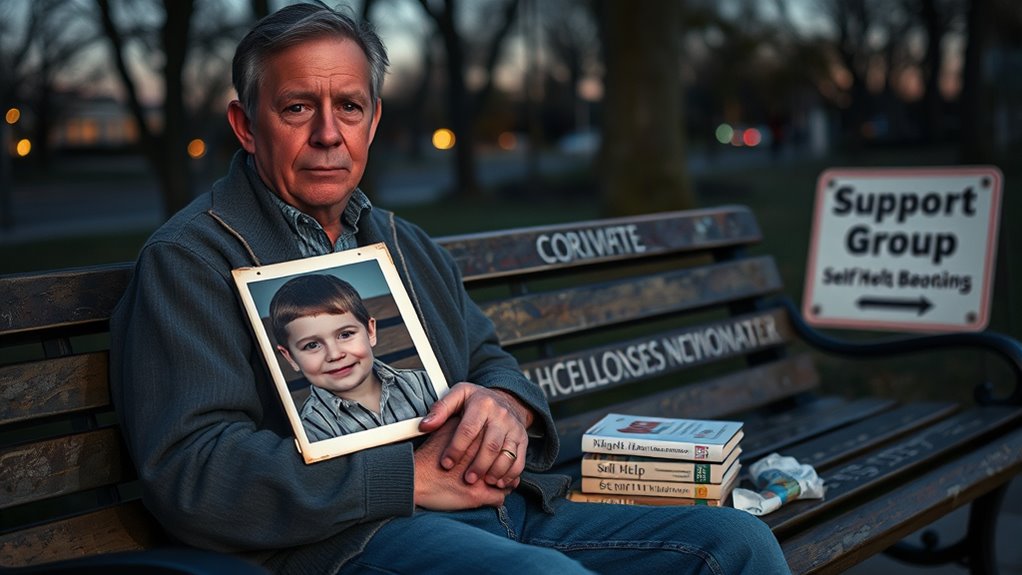To find support for managing BPD, addiction, and fatherhood, start by reaching out to mental health professionals like therapists and counselors experienced in these issues. Join support groups for fathers dealing with mental health and substance challenges, where shared experiences provide understanding and guidance. Involving family therapy can strengthen your relationships and create a supportive environment. If you want to learn more about building stability and creating a healthy future for your family, keep exploring options available for you.
Key Takeaways
- Consult mental health professionals experienced in BPD and addiction for tailored therapy options like DBT.
- Join support groups for fathers facing similar challenges to share experiences and gain emotional support.
- Seek family therapy to improve communication, rebuild trust, and create a supportive home environment.
- Educate children about mental health issues in an age-appropriate manner to foster understanding and reduce stigma.
- Access community resources and parenting programs focused on mental health and addiction recovery to strengthen your parenting skills.

Have you ever wondered how borderline personality disorder (BPD) and addiction intersect with the challenges of fatherhood? If you’re navigating the complex feelings and behaviors that come with BPD and addiction while trying to be there for your children, you’re not alone. Many fathers face this difficult combination, feeling overwhelmed and unsure where to turn for support. Recognizing that these issues can impact your ability to connect and provide stability is a crucial first step. It’s important to understand that help is available, and seeking it doesn’t mean you’re failing as a parent; it means you’re committed to becoming the best you can be for your kids.
Facing BPD and addiction as a father is challenging, but support and healing are possible. You’re not alone.
When it comes to managing BPD and addiction, professional support can make a significant difference. Mental health professionals, such as therapists and counselors, are trained to help you develop coping strategies tailored to your specific needs. Dialectical Behavior Therapy (DBT), in particular, has proven effective for BPD, teaching skills to regulate emotions, improve relationships, and reduce impulsivity. Many therapists also specialize in addiction treatment, offering integrated approaches that address both issues simultaneously. Finding a therapist who understands the unique struggles of fatherhood can help you develop healthier ways to handle stress and emotional upheaval, ensuring you stay present and engaged with your children.
Support groups can be another vital resource. Connecting with others who face similar challenges provides a sense of community and understanding. Parenting groups focused on mental health and addiction can offer practical advice, emotional reassurance, and a safe space to share your experiences. These groups often include fathers who get it — who know the ups and downs of managing BPD and addiction while trying to be a good parent. They can remind you that you’re not alone and that recovery and growth are possible. Additionally, understanding the importance of mental health support can motivate you to seek out the help you deserve.
In addition to professional help and peer support, consider involving your loved ones in your journey. Family therapy can foster communication, rebuild trust, and create a supportive environment for your recovery. Educating your children about your struggles, in an age-appropriate way, can also help them understand what you’re going through and reduce misunderstandings. Remember, seeking support is a sign of strength, not weakness. It shows you’re dedicated to healing and to creating a healthier environment for your children.
Ultimately, the path to managing BPD and addiction while embracing fatherhood isn’t easy, but it’s within your reach. By reaching out to mental health professionals, connecting with support groups, and involving your family, you’re taking powerful steps toward stability. Your effort can lead to stronger relationships, better emotional regulation, and a more positive future for you and your children. You don’t have to face this alone — help is out there, ready to support you on this journey.
Frequently Asked Questions
How Can I Balance Treatment for BPD and Addiction as a Father?
You can balance treatment by creating a structured routine that prioritizes both your mental health and parenting. Communicate openly with your healthcare providers to coordinate your therapies, and consider joining support groups for fathers facing similar challenges. Practice self-care consistently, set realistic goals, and involve your family when possible. Remember, maintaining honesty with yourself and your loved ones helps you stay committed and manage both treatments effectively.
Are There Specific Support Groups for Fathers With BPD and Addiction?
Yes, you can find support groups tailored for fathers facing BPD and addiction. Think of these groups as lighthouses guiding you through stormy seas, offering hope, understanding, and shared experience. Many organizations, like local mental health centers or online platforms such as Meetup or NAMI, host specialized groups. Connecting with others who understand your journey can strengthen your resolve and help you navigate your path with confidence and compassion.
What Legal Rights Do Fathers With Mental Health Issues Have Regarding Custody?
You have legal rights to custody regardless of mental health issues, but courts prioritize the child’s best interests. Your mental health condition might be considered if it affects your ability to care for your child safely. To protect your rights, work with a family law attorney who can present evidence of your stability and commitment. Staying engaged in treatment and demonstrating responsible parenting can positively influence custody decisions.
How Does BPD Impact Parenting Skills and Child Development?
Imagine parenting as sailing a boat through turbulent waters—you need steady hands and clear vision. BPD can make emotional currents unpredictable, leading to mood swings and impulsivity that challenge your parenting skills. This may affect your child’s sense of security and development. Recognizing these impacts allows you to seek help, develop coping strategies, and navigate parenthood more effectively, creating a safer, more stable environment for your child.
Can Therapy Effectively Address Both BPD and Addiction Simultaneously?
Yes, therapy can effectively address both BPD and addiction simultaneously. Specialized approaches like Dialectical Behavior Therapy (DBT) and integrated treatment plans target emotional regulation and substance use issues at once. By working with a trained mental health professional, you can develop coping skills, reduce symptoms, and improve your overall well-being. Consistent therapy provides the support needed to manage both conditions, helping you foster healthier relationships and better parenting.
Conclusion
Remember, you’re not alone in this journey. Seek support when you need it, find strength in your vulnerability, and embrace your commitment to change. Trust in your ability to grow, to heal, and to be the father your child deserves. Stay connected, stay committed, and never forget that every step forward is a step toward hope. Your courage, your love, and your resilience can create a brighter future—for you and your child.









